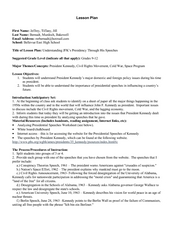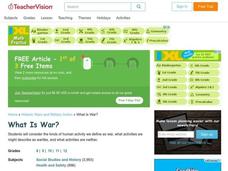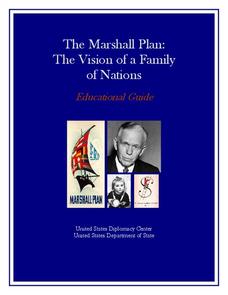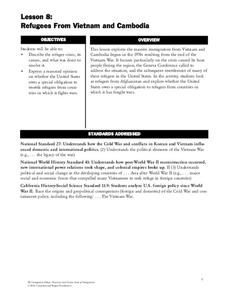Curated OER
World History Pre-Assessment
What do the members of your class already know about world history? This is a fabulous pre-assessment that will illustrate the varying levels of general world history knowledge among your young historians that you can use to inform your...
Curated OER
Understanding JFK's Presidency through his Speeches
Students reflect and discuss the major events that happened in the United States in the 1950's and 1960's. In this U.S. History lesson plan, students read and analyze the famous speeches during this time frame, then complete a worksheet...
Curated OER
From The Great War To The Great Depression
Discover details about 1920's America. In this American history lesson, students read From the Great War to the Great Depression. Students then research famous Americans from the time period and present their findings to their classmates.
Curated OER
The Kennedy Administration
From his inaugural speech to the Bay of Pigs, major events concerning the Kennedy presidency are discussed. Slides provide an array of images and web links to highlight some of the bigger issues surrounding President Kennedy. The...
Curated OER
What Was the Cold War?
A study of the Cold War can helps students learn about history through interviewing people who lived through this period.
Curated OER
Chapters 30 (sections 1 & 5) – The Cold War
In this U.S. history worksheet, students read assigned textbook pages on different topics associated with the Cold War and respond to 50 short answer questions.
Curated OER
What Is War?
What kinds of human activity do we define as "warlike"? Middle and high schoolers examine various definitions of war and types of warfare, especially as these descriptions relate to the kinds of war we are witnessing at the beginning of...
Curated OER
The Cuban Missile Crisis
Young scholars explore facets of the Cold War. In this Cold War history lesson, students research a Cold War event in order to write a news story about the events that features direct quotations and images.
Clark County School District
Hollywood's Take on the Cuban Missile Crisis: Thirteen Days
Watching the film Thirteen Days is an engaging way of acquainting learners with the Cuban missile crisis, and this learning exercise is the perfect accompaniment for viewership! It includes 15 questions for your young historians to...
DocsTeach
Apollo-Soyuz: Space Age Detente
The Space Race saw the Soviet Union and the US go from competitors to partners. Scholars read a letter regarding the first docking of the US and Soviet space craft. Young historians also complete a written assignment and participate in...
Curated OER
Mapping World War II: During and After
In this World War II learning exercise, students follow the provided instructions to mark 2 maps according to events and outcomes of the war.
Curated OER
The Consequences of World War II
Ninth graders explore the aftermath of World War II. In this World War II lesson, 9th graders investigate the consequences of the war as they complete a post-assessment project that requires them to compose essays on the topic.
Historical Thinking Matters
Spanish-American War: 1 Day Lesson
After analyzing newspaper articles portraying different perspectives of the explosion of the Battleship USS Maine, your young historians will take a stand on which position is the most believable in both discussion and writing.
Curated OER
1950's Popular Culture
Students gain a basic understanding of Capitalism and Communism, the ideologies that fueled the United States and the Soviet Union during the Cold War.
Curated OER
The Cold War: Planning for Survival
Students prepare a documentary-style dramatization about government and personal measures taken to ensure survival in the event of nuclear war.
Curated OER
Literature and the "Age of Anxiety" (1920s and 1930s).
High schoolers examine historical events of the 1920s, World War II and the Cold War. They discover how literature reflects the economic, political, social, religious and historical concerns of a culture. Students compare literature...
Curated OER
Cuban Missile Crisis
Eleventh graders determine how causation shaped the Cuban Missile Crisis. In this Cold War instructional activity, 11th graders examine photographs and documents related to the crisis and analyze the television address that President...
Stanford University
Korean War
Learners study the cause of the Korean War. In this World history lesson, Students read excerpts from two different textbooks, one from South Korea, and one from North Korea. They discuss how the cause of the war differs depending on the...
Curated OER
Multiple Perspectives on the Korean War
Students interpret historical evidence presented in primary and secondary resources. In this Korean War lesson, students examine and analyze primary sources regarding U.S. involvement in the Korean War.
US Department of State
The Marshall Plan: The Vision of a Family of Nations
The European Recovery Act (aka the Marshall Plan) was designed to bring together and develop a spirit of cooperation among European nations after World War II. Class members examine the materials from the Marshall Plan exhibit and assess...
Constitutional Rights Foundation
Refugees From Vietnam and Cambodia
The United States may have pulled its troops from the Vietnam War in 1973, but the conflict was far from over for the citizens living in Asia at the time. An informative resource lets learners know about the wave of over 220,000...
Curated OER
Thaw in the Cold War: Eisenhower and Khrushchev at Gettysburg
Middle schoolers discover how President Eisenhower's brand of diplomacy at this Pennsylvania farm temporarily eased the tensions of the Cold War.
Curated OER
Compare and Contrast Timelines of the World
Seventh graders create a classroom timeline of important world events. This instructional activity is meant to be used during the entire school year. As the school year goes along, events are added to the timeline as chosen by the class....
Smithsonian Institution
Battle of the Bulge: America Responds to a German Surprise
World War II and the Battle of the Bulge are the focus of a history resource. Exercises include analyzing images, writing letters in the mindset of a soldier, and even immersing oneself in a cold experience to better empathize with the...

























